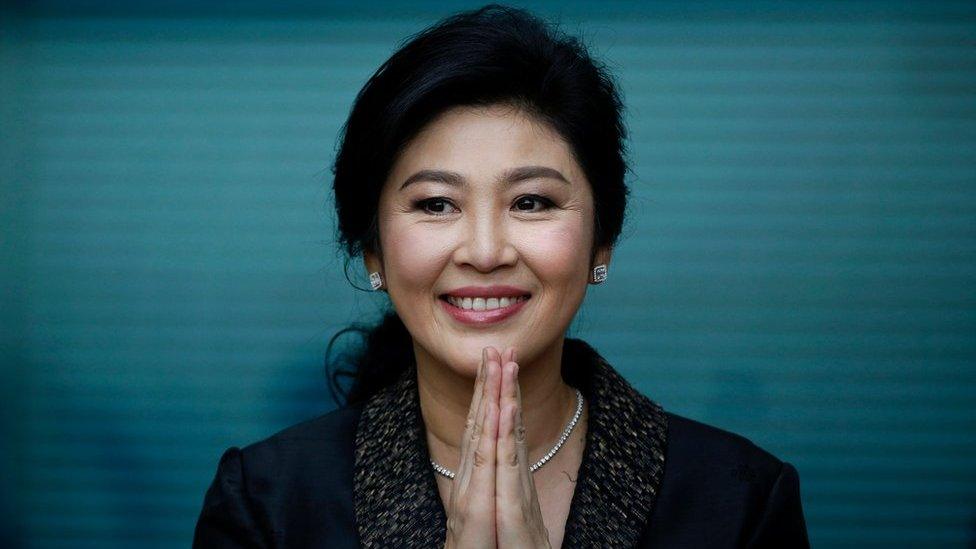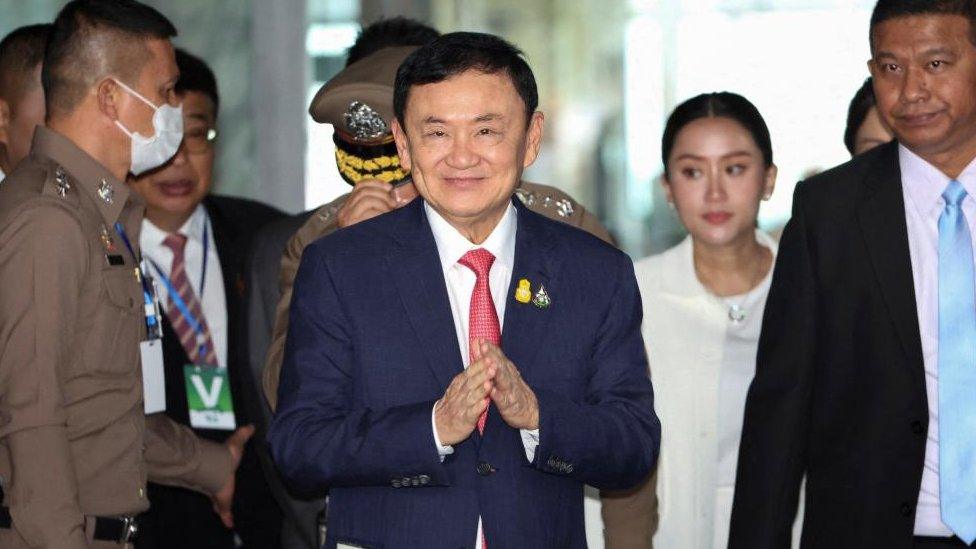Thaksin, the protesters and the battle for Thailand's soul
- Published
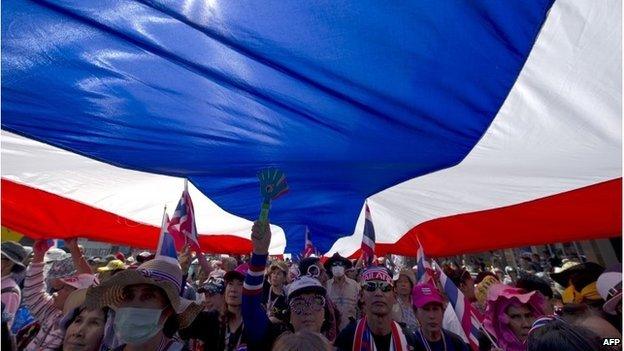
Anti-democratic? Perhaps. But do they have a point about Thaksin?
It is not easy to feel sympathy for protesters who are often clearly well-off, show surprising ignorance - and at times contempt - for the political preferences of poorer Thais, and who are waging a campaign against electoral democracy.
Some have likened the supporters of the People's Democratic Reform Committee in Thailand, to fascism in Europe. Their determination to stop this election, culminating in scenes of polling stations being blockaded and voters assaulted, have done immense harm to their image, in Thailand and especially abroad.
Yet the movement has aroused a passionate following among Bangkok's middle-class, and gets plenty of sympathy well beyond its core supporters.
It is a minority trying to force out a government elected by a clear majority. But the grievances and fears you hear expressed time and again at the protests are genuinely felt and widely shared in Thailand. They cannot just be dismissed.
Simply put, they believe that if the Pheu Thai party, headed by Thaksin Shinawatra's sister, Prime Minister Yingluck Shinawatra, is allowed to win a sixth successive election victory, Mr Thaksin will use his wealth and the power of office to ensure his family dominates Thailand for generations.
How reasonable is this?
"He certainly had ambitions to run the country for a very long time, rather like [Singapore's] Lee Kuan Yew or [Malaysia's] Mahathir Mohamad," says academic Chris Baker.
"He was very aggressive in moving into new areas of business, with the help of government power. But to say he would dominate everything is a massive exaggeration. It would be beyond the capacity of one man to dominate the Thai economy, which has a number of capitalists far bigger than Thaksin."
Taboo topics
Another charge levelled at Mr Thaksin is that he was corrupt on an unprecedented scale. Lots of allegations are thrown at him, and lots of cases investigated after he was overthrown by a coup in 2006.
But his only conviction was for a relatively minor conflict of interest relating to his wife's purchase of land in 2002.
As for precedents, before he died in 1963 military ruler Sarit Thanarat siphoned off riches conservatively estimated at 1% of Thailand's economic output. Corruption has been endemic in politics and business for so long that it is the rare clean politician who has stood out.
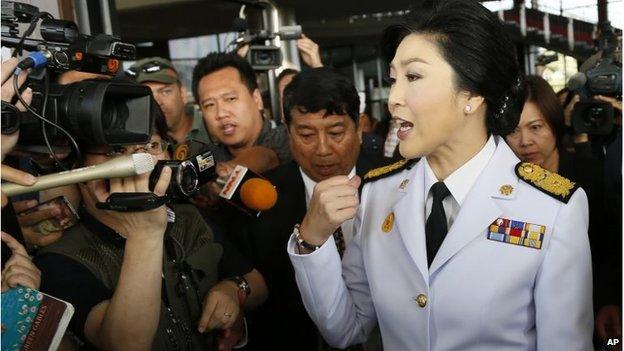
Yingluck Shinawatra is often accused of running a proxy government for her brother
Chris Baker says: "The clever thing Thaksin did was that, unlike previous figures who made money by dipping their hands in the till, he used power to increase the profits of his companies, and increase the number of companies in which he had a stake."
There are other fears expressed by the protesters. One is that Thaksin threatens the monarchy.
The severe lese-majeste law prevents any open discussion of this, but the notion that with his ambition and mass support base in the countryside Thaksin could somehow supplant the exalted position held for six decades by King Bhumibol Adulyadej, who is now elderly and very frail, is a source of anxiety.
Mr Thaksin has always strongly asserted his loyalty to the monarchy.
Rural-urban divide
The other fear is that he will squander resources buying electoral support with populist policies. His opponents point to the troubled rice-purchase scheme, under which the government has been buying most of the rice crops for the past two years at a price 50% higher than world prices.
It is certainly wasteful, and expensive enough to prompt warnings from the IMF of potential damage to Thailand's fiscal position.
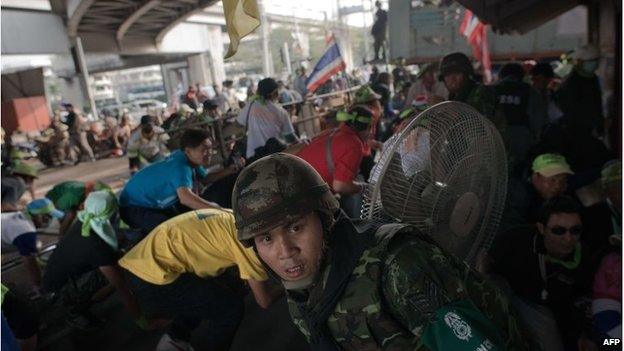
Protests have sporadically erupted in violence, including a gun battle in Bangkok on the eve of the poll
But it is his party's populist policies that have earned him such staunch loyalty among many lower-income Thais.
This is not always blind loyalty to Thaksin. I have been told many times by people in the pro-Thaksin heartland of the north-east that they are willing to support any government willing to help lift their living standards.
Mr Thaksin's party was simply the first. It has given him a hold on their allegiance for now.
"It's true, Pheu Thai 'owns' the brand of 'people's champion'," Democrat party politician Korn Chatikavanij said to me several months ago.
He acknowledged then that his party has yet to find a way to compete, having lost every election since 1992. In this election, it has chosen instead not to take part at all. But
it is not just the benefits brought by Mr Thaksin's party that explain its popularity.
People repeatedly speak of the sense of empowerment they have felt in being able to elect a government they see as representing their interests, and not one backed by the traditional Bangkok-based royalist and business establishment.
The statistics speak for themselves. Thirty years ago less than 10% of the national budget went to areas outside Bangkok. That has risen to roughly 25% today.
Media brainwashing?
So the idea that well-heeled protesters in Bangkok are trying to overthrow the government they have elected offends many in rural areas.
"What we are fighting for, in defending this election, is equality - equality in politics", said Tida Tawornseth, who leads the pro-government red-shirt movement, the UDD.
On the other hand, a lot of Bangkokians are appalled at the idea that they can be outvoted by maids, drivers and farmers, who will then choose - in their view - a profligate, corrupt and high-handed government.
Their explanation for the successive victories of the Thaksin camp is usually that the elections are fraudulent, or bought with bribes, though there is no evidence that either have significantly influenced the results.
Then they often point to the limited education of rural voters. "They have no ideas, they just watch the red-shirt TV channels and believe everything they hear," one protest supporter told me recently.
The irony is that many of the protesters spend hours watching their own Blue Sky channel, which broadcasts endless tirades against "Tyrant Thaksin".
Eight years of unresolved political rivalry has entrenched mistrust, misunderstanding and outright hatred on both sides.
The absence of any group with sufficient stature to try to broker a compromise is striking and worrying, as is the presence of armed groups on the fringes that are increasingly willing and able to confront each other.
- Published1 February 2014
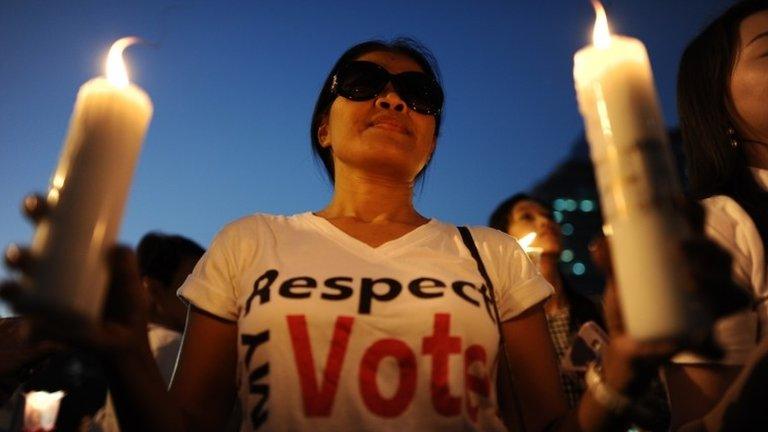
- Published22 May 2014
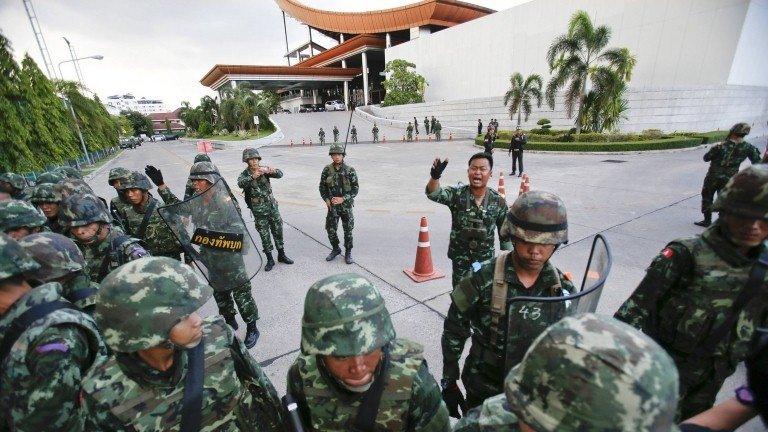
- Published23 August 2017
